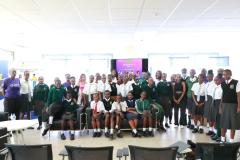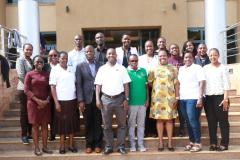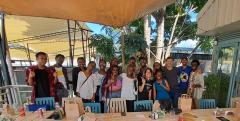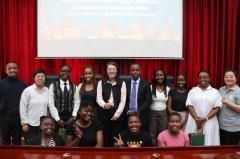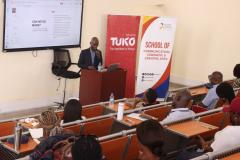History and Archives -SGSRE
United States International University-Africa Research Portfolio
United States International University-Africa (USIU-Africa) has a 50 year history of providing quality education and research in Kenya whose accreditation is granted in the United States of America by WASC Senior College and University Commission and in Kenya by the Commission for University Education. The broad mission is achieved through the regular academic programs, research and industry linkages whose activities are hosted in six schools namely; School of Graduate Studies, Research and Extension, School of Pharmacy and Health Sciences, School of Humanities and Social Sciences, School of Creative Arts, Cinematics and Communication, Chandaria School of Business and School of Science and Technology.
Our services to the industry and government are based on a unique philosophy called CALU (Community Academia and Linkage at USIU-Africa) that involves engaging the communities and their stakeholders in problem identification, analysing the problem qualitatively and quantitatively, developing pragmatic solutions to those problems, implementing the solutions and evaluating the impact that the solutions have in solving the identified problem. As such the concept is useful in developing business models, theories of change, policy frameworks and evaluation frameworks that create lasting solutions. The 136 fulltime faculty in various disciplines are renowned in their areas of expertise and conduct high level research that speak to the community needs and are involved in diverse multidisciplinary projects locally, regionally and globally.
Graduates Faculty and Staff
USIU-Africa offers high quality education that prepares students for life because the curriculum requires a broad base of knowledge, in addition to a high level of accomplishment in their chosen field. All students acquire the basic skills in communication, technology, qualitative and quantitative analysis and research needed for success in today’s job market. In addition, they gain perspectives on history and culture in a learning environment that promotes global understanding and multiculturalism.
Research Portfolio
USIU-Africa takes pride in conducting research that addresses external stakeholder concerns. Below is a summary of projects undertaken by staff and faculty at the University;
- Development of a citizen observatory early warning system for disease outbreak – This study was conducted to determine common infectious diseases in the pilot area, develop a framework for an early warning system, and finally design and develop a prototype to be used test the framework.
- The role of culture and literacy in knowledge utilization and management of cancer in Kenya -
The study examined cultural and literacy influences on knowledge utilization and management of cancer in Kenya. Using both a quantitative and qualitative design, the study reported strategies for providing adequate, comprehensible and easy to access knowledge and information on screening, prevention and management of cancer.
- Anti-Oxidative Potential of Honey and Absorbic Acid in Yoghurt Fortified with Omega-3 Fatty Acids in collaboration with Technical University of Kenya and the University of Nairobi ( who are in the process of filing the patent). This knowledge can be used to fortify other types of food. In the same field there is also an on-going project on promotion of nutritional health properties of a jackfruit in Western Kenya and Uganda sponsored by the International Foundation for Science.
- In partnership with Rhodes University and University of Ottawa, USIU-Africa is conducting a joint research on the use of nanotechnology to develop materials that can provide solutions for current environmental issues, such as water and soil decontamination, as well as the design of new systems to reduce the cost of current methods of purification. This is a South Africa –Canada – Kenya project, which is part of the South Africa–Canada Research Chairs Trilateral Partnership Initiative (SACRCTPI). The initiative is part of the broader South Africa–Canada Research Chairs Initiative which is jointly funded by Canada’s International Development Research Centre (IDRC) and South Africa’s National Research Foundation (NRF).
- The National Commission of Science Technology and Innovation (NACOSTI) and France funded a project on analysis of herbal medicinal plants (margat mathenge) to be used in manufacturing of drugs in Kenya and France. In relation to it, World Bank funded a project that involves evaluation of anti-microbial activities for application of medical products such as bandages and use of plant materials for colour dying. While the United States Agency International Development (USAID) APHI 2 funded a community development project that involved educating traditional healers on application of herbal medicine in western Kenya vis-à-vis the use of normal medication as subscribed in hospitals.
- Genetic & Molecular Characterization of loci in the Human Malaria Parasite Plasmodium faclciparum. This project is designed to come up with markers that can be used to inform patients that they have been diagnosed with malaria or have a high likely risk of getting clinical malaria which is fatal. The targeted population patient sample is the Kenyan population located in Kisii and Ahero.
- Fabrication of Polyamic Acid nanofilter Cartridges for Water Purification to Control Waterborne Diseases in Kenya. This is helpful as it aids in detecting methanol which causes blindness if consumed in excess.
- Testing the effect of Chronic Exposure to Catha edulis (MIRAA AKA Khat) extract on testicular functions.
- Digital Resilience amongst women in marginalized communities. The project had the overall goal of enabling women from marginalized communities to be digitally resilient and focused on their development through provision of e-skills and resources and development of a sustainable digital ecosystem to support the uptake of digital skills and services.
- Goldman Sachs, through the Chandaria School of Business has worked with women-owned small and medium enterprises from different sectors to grow their businesses. This initiative started in 2009 and is still ongoing.
- USIU-Africa has also partnered with Michigan State University (US) and 6 other universities across the continents to promote urban agriculture. The university has previously partnered with Moi University in Kenya, Makere University in Uganda, Haramaya University in Ethiopia and Michigan State University to develop open source agriculture modules.
- The university has also received funding from the Bill and Melinda Gates Foundation to develop Agribusiness modules for farmer entrepreneurs. With support from the International Development Research Centre (IDRC) and the Australian International Food Security Research Centre (ACIAR) GAME Centre tested whether the Metro AgriFood Living Lab model which involves training, business innovation services and action research, is an effective model for enhancing business opportunities for youth in the fish and poultry sectors in Kenya.
- In partnership with Colorado States University’s New Economic Venture Alliance (NEVA) the project has overseen business incubation of youth entrepreneurs in the different sectors. The alliance has facilitated networking among program graduates and new recruits. Such networks have evolved into effective mechanisms for dialogue with major entrepreneurs in Kenya. Other networking activities will include, bringing together alumni to share successes, challenges, opportunities for expanding their markets, consulting and mentorship.
Internal Review Board
Internally the university has a team of 16 board members who have been trained to ethically review both internal and external proposals in social sciences and environmental science [Internal Review Board (IRB)]. The university is also accredited by the National Commission for Science Technology and Innovation (NACOSTI) and is looking to increase the membership as well as capacity from 16 to 24 in January 2018. Certificate Number NACOSTI/NBC/AC/02516 that is valid from 21 November 2016 to 20 November 2019.
Why USIU-Africa
- Experience working with local, regional and global partners such as USAID, Goldman Sachs, Bill & Melinda Gates Foundation, World Bank, IDRC, GIZ, RBA (Retirement Benefits Authority) IRA (Insurance Regulatory Authority) and CEGA (Centre for Effective Global Action) amongst others.
- Meets all projects ethically, within the specified time frames and budget
- Diverse staff and faculty profile that is able to conduct high level research in a multi-disciplinary context
- Top notch facility
- High level efficiency with minimal bureaucracy

